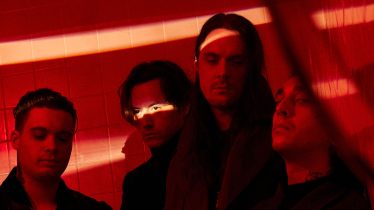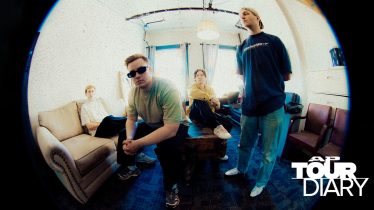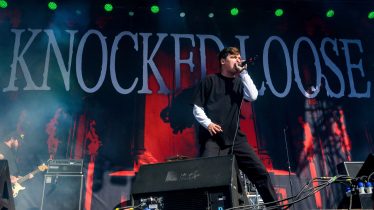Web Exclusive: A conversation with Frank Turner
Although folk-punk musician FRANK TURNER calls England home, he certainly isn’t unknown in the states. Last year, he hopped on a portion of the Revival Tour with Chuck Ragan, Ben Nichols and Tim Barry, and shortly after signed to Epitaph Records on the strength of strong stateside buzz and his 2008 full-length, Love Ire & Song. Earlier this week, Turner released the follow-up, Poetry Of The Deed. With a support spot before the Gaslight Anthem and another stint on the Revival Tour, if you haven’t heard him before, that’s likely going to change. And once you hear the accent, well, you’ll likely be on board.
INTERVIEW: Lucy Albers
Did you do anything differently than you have in the past while writing for Poetry Of The Deed?
The actual writing of the songs was the same kind of thing as on the previous records in the way that I choose to live my life through songs that are written on the road. So you get those songs I write in the morning while I’m still jetlagged and stuff like that. [Laughs.] But in terms of arrangement, I wanted to take it to my band because they’re amazing. With the previous records, I had basically done all the parts myself and then toured with it, which means that the live versions were always better than the recorded versions. I did two records like that in a row and it seemed like time to stop messing around with that kind of thing and actually have a record that sounds like the live experience from the beginning. We took a couple months to write, then went in and recorded it kind of live. We basically set up in a circle in a room and played our little hearts out. It was really fun. Aside from that kind of thing, another kind of contextual change is that whether you know it or not, when you’re writing a song, you’re writing for a certain-sized room in your head; an imaginary room where you’re going to play it. So with [2007’s Sleep Is For The Week], that was kind of for a bar or somebody’s bedroom or something like that. [Love Ire & Song] was for a couple hundred people or something like that. For this record, it was maybe a room of like 400 people in it. When it came to making the record, I wanted it to sound a little bit bigger. Given my style of writing, the stage is my life in between albums and it impacts how the next album sounds. I guess I’m very confessional in my lyrics. I’ve had a couple people while discussing the album with me, say, “Hey, you’re in a much better mood with this album.”
Is there one particular track that exemplifies this “bigger room” sound?
Probably the first track, “Live Fast Die Old.” I’m really particular about track listings on albums, as most musicians are. The first song is the first thing you hear when you put a CD in, and that’s really kind of crucial to me. I opened the first record with a song on guitar and the second album with a song on guitar with the band. But with this album, I open with a high-hat cymbal and piano and it’s only after a little while that the guitar comes in. Opening the record like that was kind of a statement. To me, it’s like saying that this is coming at you from a different angle, a different musical direction. I think that’s one of the more ambitious songs on the album. It’s funny, actually–a lot of people tried talking me out of opening the record with it, but the second I was done writing it, I knew it was an album opener. I haven’t done this huge stylistic left turn and made this record that different. But at the same time, I already made the last two albums. They exist, they’re out there, and if you want to listen to them, you can listen to them. There’s no point in me making the same record again. It’s boring for me, and it’s boring for everybody else. Even if I can say I tried to do something different, that’s worth it to me.
Not only do you use more than just an acoustic guitar, I think I heard a fiddle in there?
For “Sons of Liberty”, we had my friend come in and play the fiddle. As an overall thing, it’s important for me to sound English. I don’t want to be too contrived about it, but I want to represent where I come from musically. I don’t want people to listen to my album and think that maybe I’m American or something–not because I’ve got anything against America. It’s just not where I’m from. In that song in particular, a lot of the melodies and structures in it are traditionally English. After writing a few songs, I kind of thought, “What next?” Then I thought, “There can only be one thing: a jig led by a fiddle.” And I think it kind of works and it’s really cool.
Is there any song from the record that you particularly love?
This week, I’m really into the title track. It’s a bit more rock than things I’ve done on previous albums. I grew up listening to bands like Dinosaur Jr. and the Lemonheads and stuff like that. I’m just really happy with how the words on that song came together. I spent probably more time on the words on that song than any other on the album. There were a lot of drafts that I kicked around because I kind of knew that I had to get it right because I realized it would be the centerpiece; Maybe not musically, but certainly lyrically. I really feel like I succeeded in my efforts so I’m very happy with it.
Do you try to follow a certain theme when you write?
I don’t really try to have schemes and ideas before making records. To me, you write lyrics about things that bother you or move you enough to sit down and take up a pen and paper. I guess it’s natural that one’s relationships are featured quite heavily, and things have been going pretty well for me musically in the U.K. and internationally as well. It’s interesting for me to sit down and listen to one of my records once it’s done, because I feel like, for the first time, I can start feeling what the themes of the record actually are. It’s only once it’s done that I feel like I can get that. When I write lyrics, I spend ages literally pushing syllables around. I get really anal about it and I sit there and push tenses and pronouns around and it drives me to distraction. Musically and thematically, I have a tendency to create something that people can sing along with. I often use the pronoun “we” instead of “I.” I want to write songs about the collective experience rather than the individual experience. But it’s hard for me to think about that kind of thing. I don’t like to get too involved in being overly analytical about what I do because I feel like, you know, if it ain’t broke, don’t fix it.
Did you feel any added pressure with this album?
It’s really important to me to be completely selective with songs and not think about what people are going to like–whether it’s my record label or my friends or my girlfriend or my fans. I just want to write songs–kind of in isolation–because that’s the honest way for me to do it. It’s funny, actually; When writing and recording the album, I was kind of pushing myself to make this as good as I can because it was important to me. It wasn’t until after the album was finished and done that Love Ire & Song came out in Europe and America and it had really positive responses. Then, all of a sudden, I started panicking and thinking, “Oh my God, did I work hard enough?” But [the album] was done by that point and there was nothing I could do about it. So it was weird. I did feel some pressure, but it was after the time when it could have affected the songwriting.
Are there any artists you were listening to or influenced by while making the record?
When I was writing, I was actually having a massive E Street Band craze. Also, my favorite band over the past few years have been the Hold Steady. They’re so mind-crushingly incredible; they actually make me want to give up because they’re so fucking good. It’s funny, because I wasn’t really into Bob Dylan before. I just didn’t get it. Then I woke up one morning around July and just sort of went, “I get Bob Dylan! I get it! I just totally get it!” So I’ve been listening to a lot of Bob Dylan since then. At the moment, I’m definitely stuck on his earlier albums. I really like Bob Dylan when he’s actually trying to sing rather than trying to sound like Bob Dylan. Once things started to take off for him, he got this persona that is just irritating.
How do you want your audience to react to the new album?
There’s always that kind of agonizing timeline for artists between when you finish a body of work and when you can unleash it upon the public. It’s always a frustrating time. I’ve been sitting here with a copy of the record and I just want to go out to the streets and find somebody and hold them down and make them listen to it. With this whole sort of culture of leaks and downloads and everything, it’s nice to get to a point where it’s supposed to be in the public and you can kind of relax a little bit about that kind of thing. On the one hand, I have to honestly say that I really hope people like it and that people come to shows and sing along and have a good time. It’s also important to stress that I wouldn’t go back and change it if people don’t like it. The definition of selling out to me is writing music for someone other than yourself. Of course I hope it sells a million albums and we can get the president of the universe on the back saying how totally incredible it is. But, more realistically, I can hold my head up and say that I did the best that I could to make the best album that I could. Beyond that, it’s up to other people to make up their mind.
So you’re doing the Revival Tour again this year?
Yeah, I’m doing about three weeks on it and I’m really excited because last year it was just the most fun ever. Besides it being a good show, it kind of taps into some ideological stuff that I’m really interested in. It’s like physically removing the ego from music and making it more of a collective thing and about everybody having a fun time and joining in. I really had a great time just doing the short run last year. I would have loved to do the whole thing, but I’m going to do the biggest U.K. tour that I’ve ever done and I’m not really one to cancel shows. But Chuck [Ragan] came to me with the offer to be on the Revival Tour, and some of the dates worked out.
Is it different touring the U.S. than it is touring England?
I love touring the States. Basically–and I hope I put this in the right way–but touring in the States is a particular breeze if you’re English. You Americans love an English accent and are certainly welcoming to people with an English accent. So I always have a good time touring America. Seriously, when you get up on the stage and people don’t know you and you have an English accent and you open your mouth, half of the audience is in your pocket before you even play a song. You can just say, “Hey guys. How are you?” and half the audience is already on your side. It’s funny because, which I’m sure you’re aware of; a lot of people around Europe have such negative stereotypes about Americans, which always kind of pissed me off. America has always been one of the most open, receptive places I’ve ever traveled. I really love it. alt







